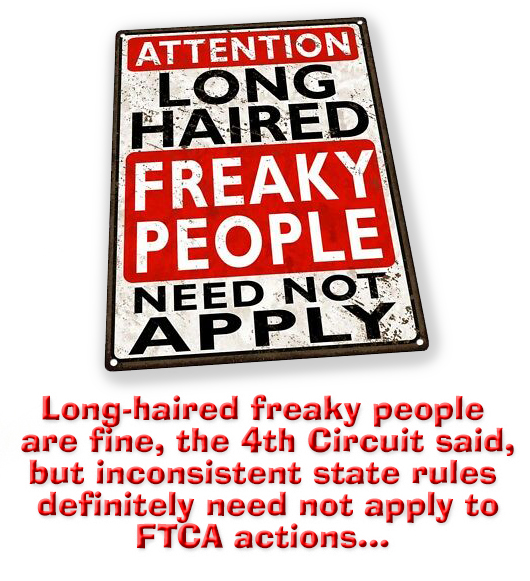We post news and comment on federal criminal justice issues, focused primarily on trial and post-conviction matters, legislative initiatives, and sentencing issues.

LEGAL ABUSE CONTINUES AFTER SEX ABUSE ENDS
The California office of a New York law firm announced last week that it had sued the Federal Bureau of Prisons alleging that 10 inmates were sexually assaulted while in BOP custody while housed at FCI Dublin. The action was brought under the Prison Rape Elimination Act.
Slater Slater Schulman LLP said at least 20 different BOP sex abuse perps have been identified by at least 92 former female inmates at FCI Dublin. And the lawyers are going after them.
 However, a 6th Circuit decision last week suggests that holding the BOP liable for its employees’ sex crimes could be a hard sell.
However, a 6th Circuit decision last week suggests that holding the BOP liable for its employees’ sex crimes could be a hard sell.
L.C. (we’ll call her ‘Lonnie,’ not her real name) was in the BOP’s Residential Drug Abuse Program at FMC Lexington when her path crossed with Hosea Lee, a BOP RDAP instructor and serial rapist. When happened then was ugly and left Lonnie with a sexually transmitted disease. Hosea was eventually walked off the compound, arrested and convicted.
Lonnie was traumatized by being repeatedly raped and assaulted by a person she was powerless to resist. Eventually, she got medical treatment for herpes, at which time a BOP Health Services nurse told her that Harry had given herpes to all of his inmate victims. She said another BOP employee, a counselor, told her that Hosea had been reported to BOP officials a long time before she had been raped.
Lonnie sued the BOP under the Federal Tort Claims Act, arguing that the agency had a duty to protect inmates from serial rapist employees and it negligently failed to do so. To make clear how seriously the BOP takes its obligations to protect inmates from criminal sex acts of its own staff, the BOP argued in court that it had discretion whether to protect female inmates from sexual predator staff and anyway, Lonnie had not made a plausible claim that BOP management knew that Hosea liked to rape female inmates.
 Under the FTCA, a federal agency is immune from being sued for negligence if it is accused of not performing a function that is discretionary or grounded in policy. The district court held that investigating and taking action where the BOP has become aware of alleged misconduct is discretionary, so Lonnie’s FTCA suit had to be dismissed. Even if that were not so, the district court said, Lonnie’s negligence claim should be dismissed under Fed.R.Civ.P. 12(b)(6) because her complaint failed to “allege sufficiently” that the BOP knew or should have known of Hosea’s attacks.
Under the FTCA, a federal agency is immune from being sued for negligence if it is accused of not performing a function that is discretionary or grounded in policy. The district court held that investigating and taking action where the BOP has become aware of alleged misconduct is discretionary, so Lonnie’s FTCA suit had to be dismissed. Even if that were not so, the district court said, Lonnie’s negligence claim should be dismissed under Fed.R.Civ.P. 12(b)(6) because her complaint failed to “allege sufficiently” that the BOP knew or should have known of Hosea’s attacks.
Last week, the 6th Circuit left Lonnie with nothing. The Circuit agreed that BOP Program Statements impose a mandatory requirement that the first BOP official with “information concerning incidents or possible incidents of sexual abuse or sexual harassment,” report such information and investigate immediately. “These are mandatory regulations and policies that allow no judgment or choice,” the 6th said.
But Lonnie had not “plausibly alleged that BOP officials failed timely to report or investigate information that Lee may have been attacking women incarcerated at FMC before November 22, 2019,” the Court ruled. While Lonnie pointed to her allegation that a BOP told her that Hosea had been reported “a long time ago,” her complaint “provides no context for when the counselor made the statement, which limits our ability to draw inferences that the counselor herself knew of Lee’s attacks before November 22, 2019, or that the counselor later came to learn that others knew of his attacks before then. [Lonnie’s] allegation that a medical department staffer told her on February 18, 2020, that all of Lee’s victims had contracted herpes does not permit the inference that staff treated multiple other victims before November 22, 2019, and knew then that each person they were treating had contracted herpes because Lee had attacked them.”
 The Circuit admitted that “there is of course a possibility that some BOP officials knew of Lee’s assaults before November 22, 2019, and failed to act on that information… With so many holes in the timeline in [Lonnie’s] allegations, we cannot plausibly draw the necessary inferences in a manner that satisfies the pleading standard.”
The Circuit admitted that “there is of course a possibility that some BOP officials knew of Lee’s assaults before November 22, 2019, and failed to act on that information… With so many holes in the timeline in [Lonnie’s] allegations, we cannot plausibly draw the necessary inferences in a manner that satisfies the pleading standard.”
In an opinion piece appearing on CNN two weeks ago, US District Court Judge Reggie Walton (District of Columbia) wrote that a commission he served on heard from former prisoners who “described in detail to me and to my fellow commission members the abuse they endured while incarcerated, sometimes over many years. Some recounted how they were disbelieved, silenced or unofficially punished for speaking out and seeking help. The formerly incarcerated people who testified spoke of the guilt, shame and rage that consumed them after being sexually assaulted and how the abuse cast a shadow over their lives even years after they were released — trauma evident in their voices, on their faces and in the tears many shed.”
As the government made clear before the 6th Circuit, it will take any position necessary – even that the BOP is not liable if it knows its employees are raping prisoners – to avoid paying damages to those harmed by agency negligence.
PR Newswire, Approximately 250 Survivors of Sexual Assault File Lawsuits Against U.S. Federal Bureau of Prisons and State of California For Being Sexually Assaulted by Correctional Staff While Incarcerated (September 27, 2023)
LC v. United States, Case No. 22-6105, 2023 U.S.App. LEXIS 25695 (6th Cir. September 28, 2023)
CNN, Opinion: Sexual assault should never be part of a prison term (September 17, 2023)
– Thomas L. Root








